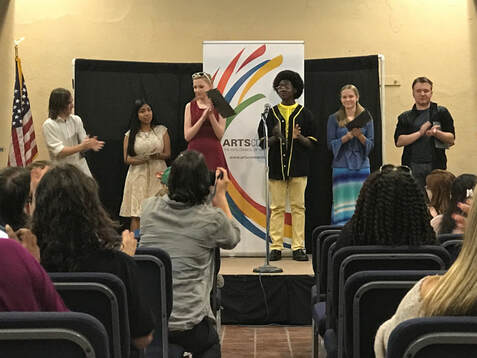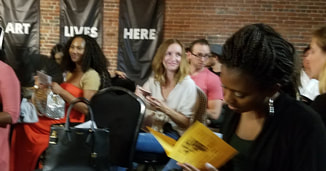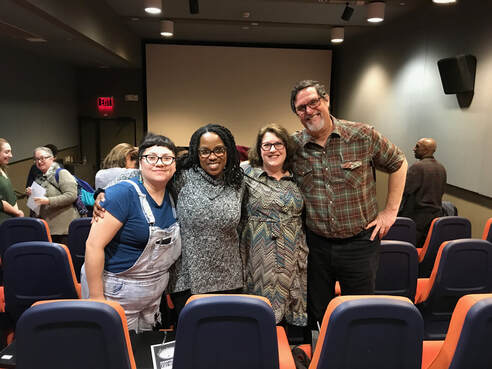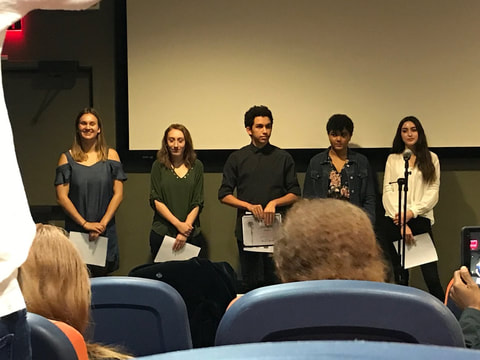On the Write SideWriting and reading in community:
I share my observations and experiences on writing, reading and listening. Venues include: open mics, Zoom readings, workshops, publications, book clubs and beyond... because everything has a story, it is open for interpretation. |
 The last post I wrote and almost published was in March 2018 when I went to an Association of Writers and Publishers (AWP) conference in Florida. I was fortunate to be on a panel discussion along with with Literary Laureate, Nikia Chaney, author of Us Mouth, Allyson Jeffredo author of Songs After Memory Fractures, CSUSB Professor Julie Paegle, author of Twelve Clocks who had been nominated for a Pulitzer Prize and Isabel Quintero author of the award-winning book, Gabby, A Girl in Pieces. Gratefully, I know them all as kind, authentic, giving people who happen to love reading and writing – so I felt included and there was no judgment on whether I should be a panel member. Everyone else had an MFA – and though I have an M.Ed. I felt like I was missing a membership card. It wasn’t anything anyone said or did. No one looked at me with the attitude of – we just included you because you fit some needed visual requirement – like being another woman to round out the panel. It was a great experience in many ways – too many to write about in this one post. Truth be told, I always feel a bit inadequate on panels… what helps me push through is the group Women Who Submit. We recognize and talk about the imposter syndrome – which we acknowledge as a very real thing, as real as a person sitting in a room pointing at you – accusing you of pretending to know how to write. You couldn’t possibly be a writer. Who do you think you are? If you think anyone thinks you are a writer, you are fooling yourself… you are an imposter! According to Psychology Today it is “more prevalent among women, and specifically women of color… and there is not an official psychiatric diagnosis in the DSM for it. Ironically, the title of our panel discussion was Re-defining a Writer’s Success. We came equipped with our own personal experiences of the joy in writing and celebrating our craft first and being mindful of why we write. One of the most pertinent pieces of advice from a panel member was – don’t be afraid to fail. Yes, in WWS we embrace our “rejections” and share them as we share our “acceptances”. It removes some of the sting out of hearing “no”. We do not feel so isolated; it reminds us that it is part of the process and something we all go through. I say we, as though it is something I have been doing. I only started sharing my rejections this year, this month. Before then, I was an observer – but learning perseverance and admiring the process. It is taking me a while to embrace the “no” but watching and learning and taking baby steps helps to stomp out the imposter syndrome. Embracing rejection is now part of my definition of writing success. There are people who count their rejections as a way of letting them know they are doing part three of the hard part of writing: creating-editing-submitting. So, here I am submitting a post for the first time in three years. I am not sending it out to an editor or publisher. Here I get to wear all three hats and the role of editor is the most difficult. Finding the balance is a job unto itself. Some days, I feel like I have the heart of what I want to say completed and my "inner editor" will just allow me to submit a sloppy final paragraph. That is what happened yesterday, and then when I went back and read this post today I was mortified. The highly critical "inner editor" went to work and for a moment I almost took this post down too. But here we are, not perfect - but better and submitted. Note: If you feel you struggle with imposter syndrome, here is a brief article Feeling Like a Fraud? by Kristen Weir and published by the American Psychological Association.
8 Comments
 Poetry Out Loud Competition at the Garcia Center Poetry Out Loud Competition at the Garcia Center This year started with a double portion of student poetry as I was invited to be a judge for Poetry Out Loud in Riverside and San Bernardino. I expected it to be precisely the same experience as the Riverside event because the goals are the same. When my son was in high school speech and debate, we went to a wide variety of locations in California, and no matter where we went, the experience was a mirror of the one before; not so with Poetry Out Loud. The tone in Riverside is friendly but formal. I am not sure if it is because it is inside a theater with fixed seating and controlled lighting, which impacts conversation and focus. The venue and building seem to give a command that we are there for business and full attention is required. We (parents, students, teachers, and judges) are serious with anticipation and ready for competition. The judges have brief conversations in hushed tones. I didn't notice students talking and laughing with each other and the weather and January 20th protests outside were outside; once inside the theater we entered another world. In San Bernardino, it was a pleasant sunny day with a light breeze and the feel of a spring day even though it is supposed to be mid-winter. There are two young people sitting next to the fountain in the center of the courtyard of The Garcia Center in San Bernardino. They were relaxed, chatting and enjoying each other's company as though waiting for a class to begin. Later I was pleasantly surprised to find that one of the students was in the competition. The audience is seated in rows in metal folding chairs in, what feels like, a small auditorium. The judges, Tim Hatch, Isabel Quintero, George Hammons and myself are seated in the back of the room at tables and we are enjoying conversations about art shows, writing conferences and teaching positions. The door remains open during the Poetry Out Loud event. However, once the competition begins students are serious, the tension of competition is in the air. and we are all attentive. As scores are tabulated to announce the winner the program organizer approaches the judges and asks if we want to make comments and we all decline but we are not opposed to having the students talk to us afterwards. Students are called up one at a time and the winner announced. We applaud and take photos. This same experience is mirrored in Riverside and the judges are thanked for our time by the event organizer and the father of the winner, Jackson Dean, whom we later find out will compete in Sacramento. It is an enriching experience and we leave with the delight of having seen young people passionately present some of the most well-known selections of poetry. In San Bernardino we have an after dinner experience of chatting with old friends as families, teachers and judges randomly gather. A young man approaches me and asks what he can do to improve his presentation. It is a moment that teachers dream of when a student is intrinsically motivated and eager to learn for self-enrichment, a sign that this person will be a lifelong learner. There is no scholastic grade attached to this conversation. It is a perfect way to end the event.
 I didn't take the time to talk with Dasan Ahanu at The Water Hole 2016 Winter Retreat , I wouldn't have known what to say and in those situations I find that listening is far more important. A year later I want to express my gratitude for what I learned and how I used what I learned in his workshop. “Pretend you are saying these words to your aunt,” he guided one of the poets, and automatically the tone of her voice softened and her body language was more fluid. It took all of thirty seconds to see the dramatic improvement. Note to self: Visualize who you are talking to or might be talking to when presenting a poem. Then the final night of open mic at TWH, I heard poems delivered with a s-l-o-w steady rhythm that drew us in. Although, I wasn’t in the workshop where he shared that technique, I could see Dasan Ahanu’s signature in those performances. Those poems breathed. He finds the flower and meat in the poem and within minutes is able to tell us how to make the listener smell it or taste it. Note to self: When reading a quiet short poem - take your time - let the words walk into the listener’s ear. Workshop Facilitator: Back home in California, Nikia Chaney invited me to facilitate a workshop at the Performance Alliance of the Inland Empire (PI) on performing poetry. I asked participants to choose a powerful line from one of their poems and read it. Great lines were shared but they didn’t take the listener on a journey. Before Dasan Ahanu’s Workshop: I would have tried to guide the poets to find the rhythm in the line and accentuate words. Now: Visualize who you are talking to. Who are those words intended for? A former lover? What tone do you want to use to tell her…? A police officer? Angry or fearful? Can the officer tell? Can we tell? One poet found passion in his confrontation with an officer, another found declarative statements where there once was question marks. The rapidfire performance poet who wrote to her lover slowed down and felt what she wrote. She began to cry, her voice cracked, and we all cried. Personal Growth: In an open mic I have always wanted to share some of my shorter more quiet poems but didn’t know how. Now, I breathe and let the words walk slowly into the listener’s ear. My anxiety and fear of losing the audience melts away with each word. I didn’t take the opportunity to talk with Dasan Ahanu. I wouldn’t have known what to say - I was still processing but watching him work with us and seeing his techniques in practice and then being able to use those techniques to help other poets bring their work to life is alchemy.  Yesterday, July 25th, 2017 women writers from Los Angeles and the Inland Empire gathered at Art Share L.A. to read poems and prose at the un :: fade :: able reading to commemorate the life of Sandra Bland. The scent of burning sage settled into our skin and wrapped itself around the chairs that were arranged in an open circle. Even if you didn't know the person you were sitting next to - you felt like you did. The reason for us being in the same room was a kindred common ground of remembering the life of Sandra Bland. It was explained that last year's program was one of mourning the loss of Sandra Bland. This year's gathering would be to celebrate the memory of who she is to us. Before each person shared their work we recited the mantra: "My name is, _______, and I am a Poet/ a Writers / a Musician (pick one), who speaks for and with Sandra Bland. Tonight, I dedicate my work to her unfadeable memory. SayHerName, and restore her life." By the end of the evening it was as though there was a divine connection with everyone in the room. Sandra Bland, and Fanny Lou Hamer, and tias and abuelitas and sisters and daughters and mothers from generations filled our tongues with healing and love. And my mother - July 25th was the one year anniversary of her homegoing and this was the best possible way I could honor her life, in the company of sisters honoring life. The event was curated by F. Douglas Brown and hosted by Brittany Williams. Musical preludes provide by Loyola MPC Club. There will be more events. Check out the website if you think you might be interested. |
Categories
All
Archives
November 2021
|



 RSS Feed
RSS Feed